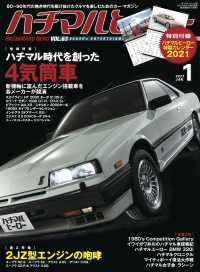- ホーム
- > 洋書
- > 英文書
- > History / World
Full Description
When Theoderic the Great entered the city of Rome in 500, as an Ostrogothic king, the citizens in Rome could have been forgiven for thinking an Emperor had returned. Everything he did, from his journey, to his arrival, and actions in the city itself, were in imitation of Roman expressions of imperial power. The role of the Emperor, however, remains complex and multifaceted, and the very powers Theoderic was seeking to emulate had complex histories of their own. It was only when Augustus, Rome's first Emperor, died in 14 AD that Rome at last admitted the truth that a Princeps now ruled, where the Senate had once held power.
Anthony Smart provides a new study of the Roman Emperor, from Augustus through the late fifth century AD, with interwoven studies on later medieval imperial rulers. The book is divided into three. The first section looks at sources (e.g. coins, speeches, histories). The second looks at themes (such as war, peace, religious unity and emotional control). The final section looks at specific examples of imperial power, and how these figures altered or modified the very nature of imperial rule. Throughout the book the author returns to the following questions: what did it mean to be an Emperor in this world? How did they govern? Were they proactive, or reactive? Is it right to say that an Emperor is what an Emperor does, or is the reality rather more complex than that? And crucially, who creates the image of the Emperor? The court, the senate, or the people of Rome?






